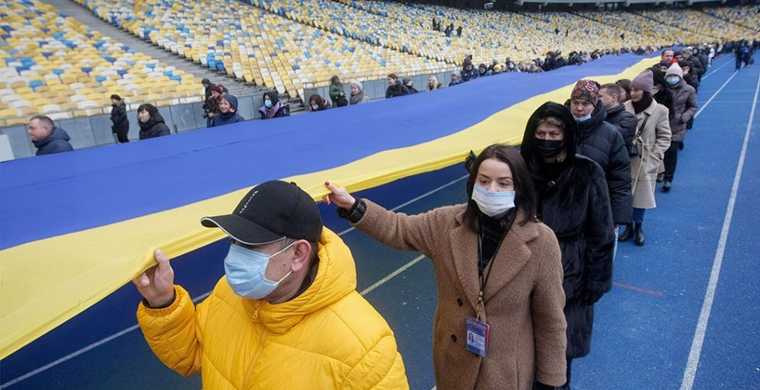Anglicans hold their breath as talks continue between Russia and Ukraine
Russians announce an end to tactical military exercises on Ukrainian border
BY JONATHAN LUXMOORE
https://www.churchtimes.co.uk/
16 FEBRUARY 2022
AS REPORTS gained ground this week of a possible easing of military tensions in Eastern Europe, members of Anglican communities in Russia and Ukraine expressed cautious optimism.
"We've prayed publicly and privately for peace and successful diplomacy, and we're very pleased at the latest news -- the Russian stock market has rallied, suggesting things may indeed be improving," the Chaplain of St Andrew's, Moscow, and Area Dean for the two countries, Canon Malcolm Rogers, said.
"Most people here still think it's absolutely impossible that Russia would go to war with Ukraine, asking how brothers and sisters could fight each other. Public opinion is clearly against it; so there's been real tension."
Canon Rogers spoke as the Russian Defence Ministry announced an end to "tactical exercises" in some Ukrainian border areas on Tuesday, and a partial withdrawal of forces to their "permanent deployment points".
He told the Church Times that he had been in touch with Anglicans in Kiev from his church close to the Kremlin in Moscow, and was delighted with the reported de-escalation.
A senior Ukrainian Anglican said that many community members had not returned after Christmas, while Western diplomats had been ordered to leave by their governments; but the "cautious optimism" was shared by those remaining in Kiev.
"Although there's some relief, this doesn't mean normal life is about to resume in an atmosphere of peace and protection," a churchwarden of Christ Church, Kiev, Christina Laschenko, told the Church Times on Wednesday.
"The situation had already changed drastically for businesses and enterprises during the coronavirus pandemic -- and when people are frightened, this creates a particular atmosphere, making it impossible to develop or interact. It's this hampering of daily life rather than the prospect of Russian tanks which poses the biggest problem."
Russia began massing forces last October, prompting fears of a three-pronged offensive against Ukraine, where pro-Kremlin separatists declared independent republics in Luhansk and Donetsk in 2014, triggering a war that has left more than 14,000 dead.
Up to 150,000 troops are currently deployed on Ukraine's borders; Russian warships patrol the Black Sea and Sea of Azov, prompting repeated warnings of an invasion, despite the arrival of US and NATO reinforcements in Poland, Romania, and other Eastern European countries.
In a TV address on Tuesday, President Biden warned that withdrawals of Russian forces had not been verified, and said that an attack on Ukraine, with devastating consequences, was "still very much a possibility".
ALAMYA service at St Michael's Monastery, Kiev, on Saturday
In her interview with the Church Times, Ms Laschenko said that Sunday services and Bible-study classes were continuing at the Christ Church chaplaincy, which is currently without a resident Chaplain.
Anglicans had been more fearful in 2014, she said, when Russia forcibly annexed the Crimean peninsula and "fierce fighting" erupted in eastern Ukraine, in the wake of the "Maidan Revolution", which toppled Ukraine's pro-Russian president, Viktor Yanukovych.
"At that time, Ukraine had almost no army, and we had absolutely no protection -- there were predictions Russian troops and tanks could be in Kiev within five to six hours," Ms Laschenko, a Ukrainian conference interpreter, said.
"The regime's forces had also killed peaceful demonstrators in central Kiev, prompting total shock. Today, we have underground shelters and a large territorial defence force; so we're better prepared and more confident -- even though we still don't know what to expect."
Besides Christ Church, which opened in 1999 close to the Khreshatyk Metro station in Kiev, the diocese in Europe's Eastern Archdeaconry has communities in Moscow and St Petersburg, bringing together expatriates and local Anglicans.
St Andrew's, built in 1885, was used as a recording studio under Soviet rule, and currently has a congregation of about 250, also attracting hundreds of visitors weekly for cultural and charitable events.
Canon Rogers told the Church Times that there had been a "very odd disparity" in reporting the current war scare, and that the evacuation of embassies had added to the "enormous stress and pressure" facing local Christians.
"While the Western media have talked constantly of inevitable conflict, Russia's state-controlled press has portrayed this as Western warmongering, and hasn't prepared people for war at all," he said.
"While I have no idea what's really going on, I think Russophobia has had a big role, and the Russian authorities have played on this. Many congregation members have mixed Russian-Ukrainian identities, and the real tragedy has been with separated families unable to cross the border. I'm just longing for people to see each other again -- for trust and respect to overcome fear and suspicion."
In a Sunday address in Rome, the Pope described news from Ukraine as "very disturbing", and appealed to "the conscience of politicians" to ensure "every effort for peace".
The Ecumenical Patriarch, Bartholomew I, called on all parties to maintain "dialogue and respect for international law", and urged "a peaceful solution to this dangerous escalation of words and means that weighs heavily and ominously on the Ukrainian people's heads".
In a Twitter post on Tuesday, the Bishop in Europe, Dr Robert Innes, asked Anglicans to join in "praying fervently for peace in Ukraine", as well as for the well-being of the country's "little Anglican community".
Ms Laschenko said that the chaplaincy enjoyed "close ecumenical relations" with Kiev's Lutheran community, sharing services with it and renting premises from it, as well as with local Roman Catholics and clergy from Ukraine's new independent Orthodox Church.
"Within our own community, Russians and Ukrainians mix and communicate freely: there's no tension at all, and claims the Russian language is being restricted are completely untrue," Ms Laschenko said.
"We've been living in these circumstances of threat for eight years now, and we're well accustomed to it; for most people here, it's just business as usual."














